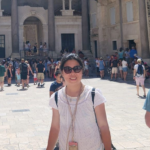This DVD
of a Diana Damrau recital (accompanied only by the harpist Xavier de Maistre) is sure to please her legions of fans. The program is generous (86 minutes of singing, plus an hour-long documentary of the soprano). Damrau generously allows her harpist two solo pieces. Damrau herself looks glamorous in a strapless black velvet bodice, red silk skirt and matching stole. The song choices are not unusual (classics by R. Strauss, Debussy, Faure, and Schumann with Bach/Gounod’s “Ave Maria” as an encore), but they all showcase Damrau’s silvery voice and diligent artistry. Not once during the recital does she degenerate into diva recital schtick. The relentless closeups only reveal a singer extremely concentrated on the art of singing.
The issue is that … well, it’s not very dynamic. One bizarre choice was to film the recital at the Festipielhaus Baden Baden. Damrau and her harpist are onstage, and the choice was to sit the audience members onstage as well, so the auditorium itself was empty. The arrangement is awkward and doesn’t allow for much interpersonal interaction between the singer and audience that often marks these recitals. In addition, the Damrau voice has always lacked a certain warmth in timbre and individuality in phrasing.
She deploys her vocal resources with skill and taste, but these art songs require that little extra uniqueness. The glory of her voice has always been her upper register — it is gleaming, shining, and secure, and the best parts of the recital are where she can let her upper register soar. The middle voice always has had this slightly hollow, shrill sound to it and it’s less noticeable in an opera house than a recital hall, when her voice is completely exposed without any accompaniment but a harp.
The first half of the recital is devoted to classic French art songs. In general she sounds better in the gorgeous, dreamy melodies of Faure and Debussy. The harp accompaniment fits these songs like a glove. A fine moment is Debussy’s “Apparition.” The second half of the program is less successful. The Schumann and Strauss lieder in my opinion need a soprano with a firmer, more substantial middle voice. They also in my opinion make their full impact with a piano accompaniment. She also can’t drop her operatic delivery in these songs, and as a result they lose their intimate, conversational feel. She’s back in her element in the Strauss chestnuts — “Wiegenlied,” “Die Nacht,” “Morgen” and “Standchen” are all gorgeously sung. She certainly rates an A for effort.Afiicianados of the diva will not want to miss the documentary “Diva Divina.” Despite its pretentious title, it’s less fluffy than the usual “behind the scenes” documentaries that often get tagged into these videos. There are onstage clips of Damrau singing Queen of the Night, Donna Anna, and Rosina. We also learn that Damrau likes to ride around in a scooter.




